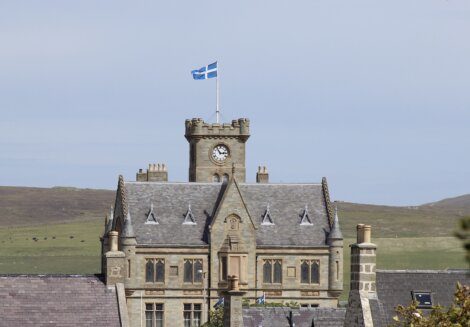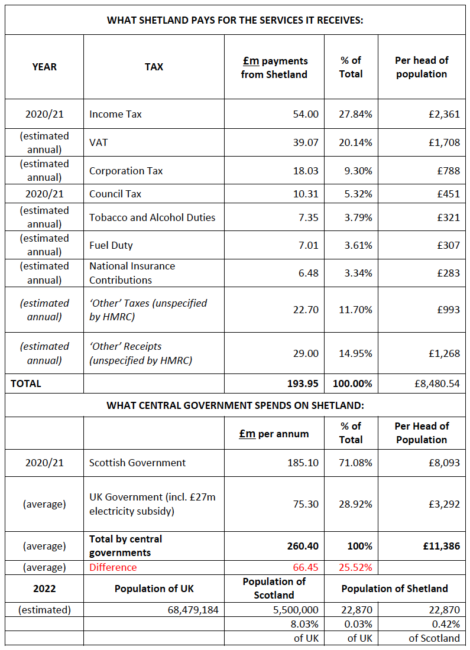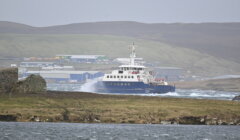Viewpoint / ‘Dear meal and greedy ministers’
THERE’S an old saying that ‘Shetland never got anything from Scotland but dear meal and greedy ministers.’ That was true, once upon a time, but still sums up the attitude of some councillors to the Scottish Government over the past five years, writes former councillor and retired journalist Jonathan Wills.
Sometimes it’s been a snarl, sometimes a growl, sometimes a whine, but usually there was an aggrieved tone in the council’s response to any Scottish Government announcement affecting Shetland.
It’s often felt as if the 2017-22 SIC leadership believed Holyrood, and particularly the SNP, was a conspiracy against all 22,870 of us Shetland residents. Our Lib Dem parliamentarians have usually been happy to echo the plaintive refrains from Lerwick Town Hall.
Recently the (soon to be departing) council leader Steven Coutts said he was “disappointed” with the SIC’s financial settlement in the SNP/Green budget. Really? Is there a council leader in Scotland who wasn’t?
The Scottish Government never has enough money in its budget to do everything it wants to do and ought to do. This is because the Scottish Parliament does not control all the public revenues of Scotland, only the fraction granted to Edinburgh by London under the ‘Barnett Formula’ – which sends some of the British taxes raised in Scotland back to Holyrood, roughly in proportion to Scotland’s population (about eight per cent of the UK total) but doesn’t always reflect the extra costs of providing public services north of the Border. Many criticisms of alleged Holyrood parsimony should instead be directed to Westminster.
With the SIC elections due on 5 May, this is a good time to consider what sort of people we would like to lead our council and how they should deal with the national authorities in Edinburgh and London. Do we want endless denunciations of the Scottish Government?
Become a member of Shetland News
Or would it help if we had representatives skilled in negotiation and compromise – leaders who understand Shetland’s true position in a country facing massive economic problems as a result of Vladimir Putin’s wicked assault on Ukraine and, as a consequence, a crisis in taxation and public spending?
There are some inconvenient facts that the new council leadership will have to face:
- With less than half of one percent of Scotland’s total population (0.42 per cent to be precise, and 0.03 per cent of the UK total), Shetland is never going to be at the front of any government’s mind, whatever its political colour, even if our oil, gas, renewable energy and seafood are of great and growing significance to the national economy.
- There are places with worse problems of homelessness, unemployment, drug addiction and child poverty than ours. This is not to belittle the real difficulties we face in Shetland, particularly with heating and travel costs, but simply to state the reality that we may not always be able to claim first priority.
- Whether we like it or not, other local authorities envy our ‘oil money’. So do some MSPs. In the current financial year 26 per cent of SIC spending is budgeted to come from the council’s investments. No other member of the Convention of Scottish Local Authorities (Cosla) can do anything like that, so the unsympathetic attitude of other councils isn’t going to change any time soon. What is about to change is the SIC’s relative prosperity.
- For many years the SIC has used investment income to cover its budget deficits, even though council finance officers routinely say such subsidies are ‘unsustainable’. But the global investment chaos caused by Putin’s war is going to hit Shetland particularly hard if the value of council and Shetland Charitable Trust investments falls, as it is already doing. Because so many public services in Shetland are provided by three trusts (Recreation, Amenity and Arts), all supported by the charitable trust, the financial position could get worse very quickly, not least because the unelected trustees are not accountable to the public and, with the best will in the world, may sometimes have different priorities from the council. We could see a conflict of interest here, much more serious than the imaginary conflict of interest over the Viking wind farm: trustees have a legal duty to protect the trust fund; this may clash with the council’s need for more money. So our new council leaders will need all the financial facts and arguments properly marshalled if they’re to explain this to the outside world – and hopefully retain and improve upon present levels of support from central government.
On 5 May we need to elect councillors who, faced with predictable financial disappointments, won’t immediately make statements to the media implying that hostile Scottish ministers are ‘selling Shetland short’ or ‘letting Shetland down’.
They need to get government ministers’ attention without antagonising them, to build alliances in the Scottish Parliament and Cosla, and to explain, politely but persistently, how Shetland’s interests can also be in the national interest. A good example is the case for bridges and tunnels, which are far too expensive for the council to build on its own but which, if funded nationally as part of the trunk road system, would save the Scottish Government considerable sums through reduced annual subsidies for inter-island ferries.
‘Facts are chiels at winna ding’
‘What’s the Scottish Government ever done for us?’ Here are some updated facts and figures from publicly available statistics:
On average, the Scottish Government spends about £185 million each year on Shetland. That’s around £8,093 for every woman, man and child in the islands. It’s much higher than the Scottish national average. Spending per head in Orkney and the Western Isles is similar. That’s simply because the cost of providing public services to small populations on scattered distant islands is and always has been higher than in mainland towns and cities.
- The £185 million a year includes the following:
- Contribution to the SIC budget: £96.95m (57%)
- Cost of NHS Shetland: £54.6m (100%)
- Shetland’s 50% share of NorthLink subsidy: £21.8m
- Agricultural subsidies: £9.4m
- Air Discount Scheme: £2.3m
- In addition, under a formula approved by Ofgem, UK mainland consumers subsidise the price of electricity in Shetland by some £27m a year.
- UK state pensions to Shetland total another £27m and other social security payments to islanders amount to £21.3m.
So, in total, Shetland receives over £260m-worth of services and support via the Scottish and UK Governments, 71 per cent of it from Edinburgh.
Are we paying our way?
Income tax paid in Shetland currently raises about £54m, according to HM Revenue and Customs and Shetland council tax contributes another £10.3m but that’s not the whole story of how the islands pay their way. No separate figures are available for other taxes raised in Shetland but if we assume they’re paid roughly in proportion to Shetland’s share of the UK population, then we get the following picture:
On this calculation, it would seem that Shetland’s annual contribution to national tax revenues is about £194m and that total Scottish and UK Government spending here is just over £260m, as mentioned above.
So at first sight it looks as if we’re paying about 75% of the costs of our share, including military spending and other UK national expenses. But we only have rough estimates for some important elements of taxation. In the table I have attributed to Shetland a proportional share of the UK Government’s unspecified ‘other’ taxes and receipts, listed in the House of Commons Library. It’s not clear if these include revenue from oil and gas licences and petroleum revenue tax.
The Shetland share of taxes shown in the table is probably an underestimate because of the very high export values of Shetland’s oil, gas and seafood, all of which generate revenue for the UK. Unless and until the British Government provides a detailed breakdown of tax revenues arising from economic activity in Shetland we won’t have a complete picture but it does seem reasonable to say that Shetland is paying its way as much as the average UK county and probably slightly more than that.
It’s equally reasonable to conclude from this arithmetical exercise that Shetland is not being treated unfairly by ‘greedy’ Scottish Government ministers in Edinburgh, nor are we subsidising either the Scottish or UK Governments.
As for the price of oatmeal, it still seems just about affordable, and it’s a very long time since we paid teinds to support the Kirk of Scotland’s ministers, for a mercy.
Jonathan Wills’ memoirs Reporter on the Rocks are available from Amazon.
Become a member of Shetland News
Shetland News is asking its many readers to consider paying for membership to get additional features and services: -
- Remove non-local ads;
- Bookmark posts to read later;
- Exclusive curated weekly newsletter;
- Hide membership messages;
- Comments open for discussion.
If you appreciate what we do and feel strongly about impartial local journalism, then please become a member of Shetland News by either making a single payment, or setting up a monthly, quarterly or yearly subscription.
















































































